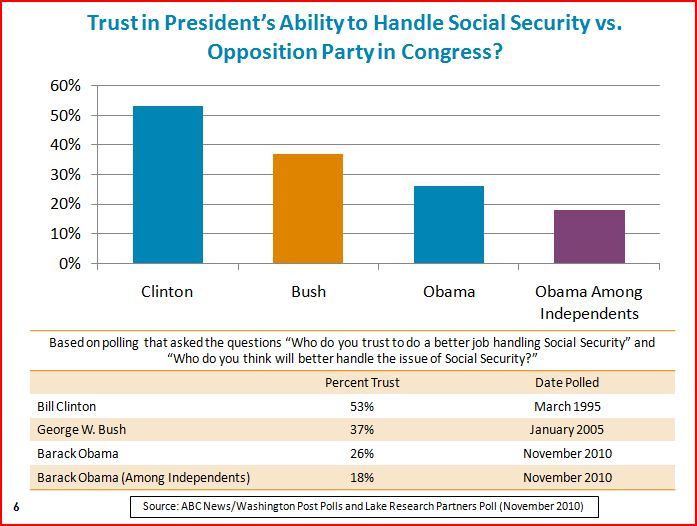(10 am. – promoted by ek hornbeck)
The New York Times reports on a poll that shows while “Americans overwhelmingly say that in general they prefer cutting government spending to paying higher taxes”
Yet their preference for spending cuts, even in programs that benefit them, dissolves when they are presented with specific options related to Medicare and Social Security, the programs that directly touch the most people and also are the biggest drivers of the government’s projected long-term debt.
Nearly two-thirds of Americans choose higher payroll taxes for Medicare and Social Security over reduced benefits in either program. And asked to choose among cuts to Medicare, Social Security or the nation’s third-largest spending program – the military – a majority by a large margin said cut the Pentagon. . . . . .
Asked what Congress should focus on, 43 percent of Americans say job creation; health care is a distant second, cited by 18 percent, followed by deficit reduction, war and illegal immigration.
If Medicare benefits have to be reduced, the most popular option is raising premiums on affluent beneficiaries. Similarly, if Social Security benefits must be changed to make the program more financially sound, a broad majority prefers the burden fall on the wealthy. Even most wealthy Americans agree.
Meanwhile, Social Security Works has a series of slides assembled from past polls that clearly indicate that Americans don’t trust President Obama’s handling of Social Security. In fact, as Richard (RJ) Eskow points out in the article, they trust him even less that they trusted George W. Bush.

The Republican privatization attempt was thought to have contributed significantly to that party’s Congressional losses in 2006. Yet the president refuses to say that he won’t cut Social Security, and he continues to have kind words for the reckless, inhumane, and unneeded proposals of his Deficit Commission co-chairs (the Commission was unable to agree to a plan).
In this climate, with these numbers, any attempt by the president to cut Social Security could only be described in one phrase: Political malpractice. Is that where he’s headed? Or will he surprise us all by delivering a stirring, unequivocal defense of Social Security? After all the suspense and fear over this issue, that would be a political moment for the ages.
But if he’s going to have a change of heart, he better act fast. The damage is already considerable. As Social Security Works explains, the 20-point advantage Democrats had on this issue for the last 15 years has evaporated, and trust in President Obama is roughly half of what it was for President Clinton on the same issue. Obama’s performance is even worse among those much-sought-after independent voters. Only 18 percent of them trust him on this issue.
It won’t bode well for the Senate Democrats either:
It would be comforting to be able to say that this is all a misunderstanding and that the president will keep his promise to defend Social Security. But we can’t do that. His silence about Social Security, especially after Harry Reid’s stemwinding defense of the program, is disturbing. Reid and other members of the Senate and House are on the front line, and any attempt by Obama to triangulate and propose “bipartisan” cuts will devastate them. That’s why there are reports like The Hill‘s of a strategic split between the president and Democrats in Congress: They’re afraid he’s going to sell them out for a personality-driven reelection campaign that suits his needs, not his party’s or the country’s.
Obama will be committing political suicide and taking the Senate Democrats with him if he doesn’t start listening to his base, now.

4 comments
Skip to comment form
Author
but will he listen?
my guess: NO
America isn’t the only country where this issue is the third rail of politics. We Japanese react the same way when ever our government proposes changes to the pension program which is similar to Social Security. It’s amazing how cavalier political leaders are with this issue when looking to score political points. I forget who said this, but their was that Franklin Roosevelt was able to sell Social Security to the American people as an insurance program rather than an entitlement for retirement which is the reason why it remains popular to this day.